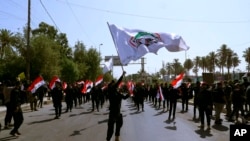The commander of Iraq's self-styled pro-Iranian "resistance" forces has threatened to mount more attacks on U.S. forces inside the country if they don't withdraw.
The threat by the commander, Khais al Khazali, coincided with a drone attack overnight that targeted U.S. forces in Kurdistan.
A U.S. coalition spokesman in Iraq confirmed in a statement Saturday that there had been a drone attack on U.S. forces at the Qiyyara base and said there had been no casualties.
In addition to promising more attacks on U.S. forces, Khazali said opposition forces would retaliate if the U.S. attacked them.
Arab media reported that Iran's intelligence chief visited Baghdad several times during the past 10 days. VOA could not independently confirm the report.
Paul Sullivan, a Washington-based Middle East analyst, told VOA that statements like the one by Khazali were mostly declarations of victory, which mirror triumphal calls from the Taliban in Afghanistan amid the U.S. withdrawal there.
"Each extremist group wants to claim a win from the U.S. leaving, and they puff their chests out in a show of 'masculinity.' What they don't mention is how they themselves have added to the suffering of their people. Real leaders take care of their people," Sullivan said.
US-Iraq ties
On Friday, Iraqi Foreign Minister Fouad Hussein and U.S. Secretary of State Antony Blinken detailed the close cooperation between the two countries.
Hussein, visiting Washington, told journalists during a press conference with Blinken that his country needed the U.S.-backed coalition to continue to fight terrorism.
However, Iraqi media reported that the country's national security adviser, Qassim al Araji, told journalists on the sidelines of the meeting that Baghdad "does not need U.S. forces in the country any longer."
Blinken told journalists at the meeting with Hussein that the U.S. and Iraq "are of course the closest of partners in the fight against [the Islamic State group] and we can take tremendous pride in what we've done together to defeat ISIS and to make sure that it stays defeated ... but the partnership between the U.S. and Iraq is much broader and deeper than even the common fight against ISIS."
Iraqi Prime Minister Mustafa Khadhimi is scheduled to meet with U.S. President Joe Biden at the White House on Monday to announce a number of agreements between their nations.
Arab media reported that the U.S. is planning to give $155 million in aid to Baghdad and discuss a number of projects involving archaeology, education and the battle against COVID-19.
Iraqi analyst Nejm Khusab told state TV that he anticipated a period of calm after Khadhimi and Biden sign the agreements.
He said the Biden administration differed from its predecessor in that it didn't want to remain inside Iraqi cities, but just to hold two airbases, Ain al Assad in Anbar province and Qiyyara in Kurdistan. He argued that that indicated a de-escalation was coming soon.
Much of the current political rhetoric in Iraqi politics appears to be aimed at the parliamentary elections in October.




